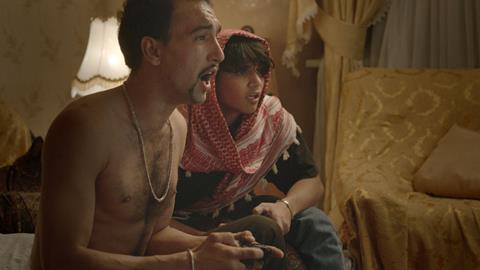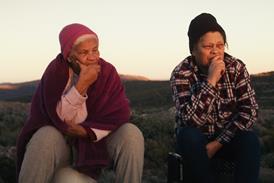Dir/scr. Aline Fischer. Germany. 2016. 84 mins

Opening the Perspektive Deutsche Kino section of this year’s Berlinale, shared with the Generation young adult sidebar, Meteor Street is a thoughtful, compassionate but over-stretched low-budget drama about a young Lebanese immigrant living in unhappy limbo with his off-the-rails older brother in a distant suburb of Berlin.
Pretty much the only women we see in the film are synchronised swimmers, pole dancers and prostitutes.
Story-wise there’s about enough going on here to comfortably fill a 30-minute short, but first-time feature director Fischer, who hails from the partly German-speaking French region of Alsace, makes up for the longueurs, some of the time, with an intense focus on her two fine actor protagonists, giving them space to grow inside the loose boundaries of the film.
She also builds up a nicely underplayed thematic web which touches on issues like cultural, political and gender borders by bringing two contrasting male worlds into contact – the love-hate sparring of a pair of Muslim brothers, and the white German motorbike club where 17-year old Mohammed earns some cash by doing odd jobs.
Those unfamiliar with Berlin topography will struggle to place the setting – the outer-city ‘burbs around Tegel airport – but this could be any Euro urban nowhere, like the Wallonian wastelands that inspire the Dardenne brothers. It’s here that Mohammed (Eliraqui) lives with his older brother Lakhdar (Ozdemir), a small-time hard guy with two pet Alsatians who shouts and breaks stuff and is permanently stuck in hyper mode, something that clearly bothers his quiet, introverted brother.
The parents? We hear the voice of a father, on the phone, telling the homesick Mohammed he should stick it out in Germany and not fall under his brother’s bad influence. But otherwise Lebanon is present only in some framed photos in a parental bedroom that seems preserved as a kind of shrine, immune from the human wrecking ball that is Lakhdar.
The jets that roar in overhead towards the runway, meanwhile, are uneasy reminders that Mohammed has fled a war zone, his childhood memories coded in TV news footage at the start of the film of Beirut bombing raids.
Roving and restless like its handsome protagonist with his slightly androgynous features, the camera tracks Mohammed as he wanders into another realm – a scrappy biker club in the suburban wood, a degraded parody of log-cabin frontiersman culture. Here he does odd jobs for the depressed club boss while being dragged into another kind of aggressive male coterie, one of resentful, dispossessed Berliners. Pretty much the only women we see in the film are synchronised swimmers, pole dancers and prostitutes.
Pulled in two directions, betrayed by both sides, Mohammed is also, the script suggests, in a gender limbo; he flees from an initiatory session with a hooker which his brother pushes him into, while a locker-room frisson at the biker club and a brief scene showing him drawn to a rent-boy cruising area hint, without really going further, that he may be attracted to men.
If all this – the combination of war scars, real and metaphorical, with the crisis of masculinity, homo-erotic impulses and culture clashes – reminds us of Claire Denis’s Beau Travail, it’s a parallel that is nailed once the French Foreign Legion is dragged into the story. But there’s enough promise in this dreamy, atmospheric first feature to forgive the small homage.
Production companies: credo:film GmbH and Filmuniversität Babelsberg
International sales: Susann Schimk, office@credofilm.de
Producers: Susann Schimk, Jorg Trentmann
Cinematography: Maurice Wilkerling
Editors: Jörg Volkmar, Jamnin Benazzouz
Production design: Paola Cordero Yannarella
Music: Matija Strnisa
Main cast: Hussein Eliraqui, Oktay Özdemir, Bodo Goldbeck, Sebastian Günther, Denis Golmé
























